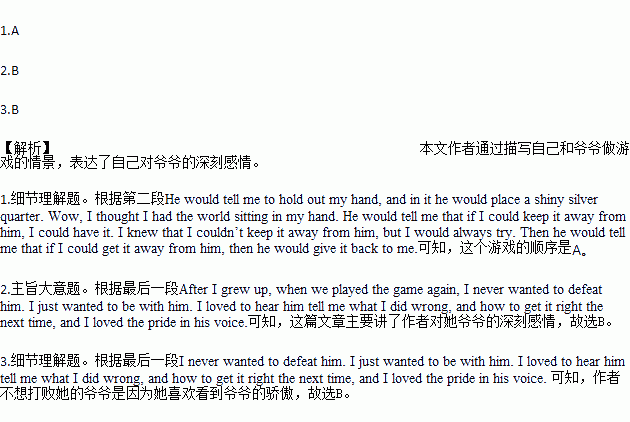题目内容
My Grandpa has arthritis (关节炎), and it’s getting harder and harder for him to do certain things.
When I was a little girl, my grandpa would play this game with me. He would tell me to hold out my hand, and in it he would place a shiny silver quarter. Wow, I thought I had the world sitting in my hand. He would tell me that if I could keep it away from him, I could have it. I knew that I couldn’t keep it away from him, but I would always try. Then he would tell me that if I could get it away from him, then he would give it back to me.
I remember feeling so small compared with him, and I also remember feeling embarrassed because I knew there was no way that I could get that quarter from him. But I tried. I would climb down from my chair, with defeat weighing heavily on my back.
“Bug?” he’d say.
“Ya Grandpa?” I’d reply, trying to sound as sad as possible.
“Here.”
There in his outstretched hand would be my quarter. It always ended the same. He would always hand it over. I always knew that I would have to wait until the game was over to get my quarter, because he had so much pride and self-worth that he couldn’t lose to a 4-year-old girl. After I grew up, when we played the game again, I never wanted to defeat him. I just wanted to be with him. I loved to hear him tell me what I did wrong, and how to get it right the next time, and I loved the pride in his voice.
1.In which order did the following things happen during the game?
a. Grandpa placed a shining silver quarter in my hand.
b. Grandpa told me if I could get it away from him, I could keep it.
c. He gave the quarter over to me and I got it.
d. Grandpa told me if I could keep it away from him, I could keep it.
A. a d b c B. a b c d
C. a b d c D. a c d b
2.This passage is mainly about _______.
A. the writer’s grandpa’s serious arthritis
B. the writer’s deep feeling for her Grandpa
C. games between the grandpa and the writer
D. grandpa’s success in all games
3.Why didn’t the writer want to defeat her grandpa?
A. She couldn’t defeat her grandpa.
B. She liked to see his pride.
C. She didn’t want to shame her grandpa.
D. She was afraid that Grandpa wouldn’t play with her.

